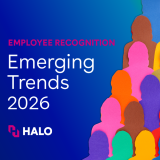Summary
In 2024, the workplace landscape continues to evolve and companies are adapting to the these employee recognition trends. Click to read more.

The Modern Workplace Reality
In the dynamic workplace landscape of 2024, the profound impact of the past five years is unmistakable. Work-from-anywhere setups, hybrid schedules, and virtual meetings have firmly established themselves as significant components of the new work reality, and in this evolving environment, the reality is that recognition can happen anywhere, anytime. Organizations continuously adapt and enhance their employee recognition strategies to attract, engage, and retain top talent, ensuring that recognition remains a vital part of the employee experience, regardless of where or how work is performed. Recognizing and celebrating employees, whether online or offline, is crucial in the digital age, fostering a strong connection that contributes to workplace success in 2024 and beyond.
Personalized Approach

In the modern workforce, there are five generations coexisting, which signifies a remarkable change in how companies tackle the concept of employee recognition and rewards. Organizations have come to appreciate the importance of tailoring recognition to each employee, considering their individual preferences, goals, and achievements. The ultimate aim is to ensure that every team member feels genuinely valued and appreciated in a way that seamlessly aligns with the company’s culture and dynamics. This personalized approach cultivates a deeper emotional connection between employees and their organizations, bridging generational gaps effortlessly.
Employer Branding

Leveraging employer branding as part of recognition efforts is critical in fostering a strong connection between employees and their organization. The way a company presents itself to its workforce plays a pivotal role in shaping employees’ perceptions of their workplace and their commitment to its mission and values. Given that nearly 38% of employees decide to leave their jobs within the first year of employment, companies are investing in immersive, personalized, and meaningful onboarding experiences. These experiences extend beyond the realm of paperwork and HR formalities; they weave a compelling narrative about the company’s culture, history, and aspirations.
Peer Initiated Recognition

The growing popularity of peer-to-peer appreciation represents another noteworthy employee recognition trend, and its appeal is easily understood. Employees increasingly value acknowledgment from their colleagues, and organizations are actively promoting a culture where employees actively appreciate their peers. This shift transcends typical workplace interactions; it nurtures a genuine sense of community within the organization, which is particularly important in a hybrid work environment where physical distances can create emotional gaps. Recognition from coworkers who understand the daily challenges and triumphs carries an authenticity that elevates its significance. This approach enhances the meaningfulness of recognition gestures, strengthens the bonds between colleagues, and boosts morale, all crucial elements for fostering a productive and harmonious hybrid work environment.
Data-Driven Outcomes

Another compelling trend gaining momentum is the strategic use of data to link employee recognition with measurable business outcomes. High-performing organizations are leveraging key performance indicators (KPIs) and relevant data to identify behaviors and achievements that directly impact business success. Recognizing and rewarding these crucial contributions can supercharge employee motivation, productivity, and engagement. This data-driven approach ensures that rewards are closely tied to tangible results that drive business excellence, creating a culture of recognition deeply rooted in performance.
Inclusive Offboarding

Many organizations are now embracing the value of an inclusive and meaningful offboarding process. This approach treats departing employees and retirees as cherished alumni, akin to how universities regard their graduates. Companies such as Microsoft and Procter & Gamble have adeptly implemented this strategy, nurturing enduring relationships with former employees. These “alumni” can serve as enthusiastic brand ambassadors, referring potential hires, nurturing client relationships, and offering invaluable insights based on their past experiences with the company. This shift underscores a commitment to the workforce and reinforces the idea that their connection extends well beyond traditional employment.
Mental Health and Well-being

The events of recent years have underscored the importance of mental health and well-being in the workplace, and this remains a significant focus for organizations. Recognizing the need to support employees’ mental health, companies are incorporating well-being initiatives into their recognition and engagement strategies. This includes providing resources, counseling services and acknowledging employees who promote a healthy work-life balance.
Deepening the Bond

As the workplace landscape continues to evolve in 2024, it is clear that adapting to employee recognition trends plays a pivotal role in fostering a solid and long-lasting bond between employees and their organizations. By personalizing recognition, leveraging employer branding, promoting peer-led recognition, utilizing data-driven approaches, embracing inclusive offboarding, and prioritizing mental health and well-being, companies can create a workplace environment that attracts and retains talent and nurtures a deep and enduring connection between employees and their organization. In this dynamic and ever-changing landscape, the ability to adapt and enhance recognition strategies remains a key driver of organizational success.












